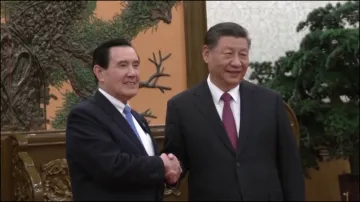China's Xi Jinping meets former Taiwan President, says no one can stop 'family reunion'
Ma Ying-Jeou, who served as the President of Taiwan from 2008 to 2016, is the first former Taiwanese leader to visit China, amid simmering military tensions between the two nations. China claims sovereignty over Taiwan and has vowed to reunify it with the mainland by force if required.

Beijing: Chinese President Xi Jinping on Wednesday met former Taiwan President Ma Ying-jeou and told the latter that outside inference could not stop the "family reunion" between the two sides of the Taiwan Strait and that there are no issues that cannot be discussed. This meeting is significant as no serving Taiwanese leader has visited China since the defeated Republic of China government fled to Taiwan in 1949.
Ma, president from 2008 to 2016, last year became the first former Taiwanese leader to visit China, and is now on his second trip to the country, at a time of simmering military tension across the strait. Ma had been widely expected to meet Xi this time around, having first met Xi in Singapore in late 2015 for a landmark summit shortly before the current Taiwan president, Tsai Ing-wen, won the election.
In the meeting that took place at the Great Hall of the People in the Chinese capital Beijing, Xi told Ma that the people on both sides of the strait are Chinese. "External interference cannot stop the historical trend of reunion of the country and family," Xi said, in comments reported by Taiwanese media. China claims the island country of Taiwan as part of its mainland and has vowed to reclaim it, by force if necessary.
Ma follows a long line of politicians from the Nationalists, also known as the KMT (Kuomintang), who have been invited to China by its authoritarian one-party government and given VIP treatment on visits around the country. Ma's 11-day trip, ostensibly at the head of a student delegation, underlines continued interactions in education, business and culture despite Beijing's threat to use military force against Taiwan.
Tensions have caused unease for many Taiwanese: Ma
Without elaborating on the kind of external interference, Xi further said, "There is no rancour that cannot be resolved, no problem that cannot be discussed, and no force that can separate us". China has never renounced the use of force to bring democratically-governed Taiwan under its control and has ramped up military and political pressure to assert its sovereignty claims.
On the other hand, Ma told Xi that tensions have caused unease for many Taiwanese. "If there is a war between the two sides, it will be unbearable for the Chinese people. Chinese on both sides of the strait absolutely have enough wisdom to handle all disputes peacefully and avoid heading into conflict," he said, using a term that refers to people who are ethnically Chinese rather than their nationality.
The Chinese President also referred to Ma as "Mr. Ma Ying-jeou" rather than the former president, given neither the Chinese nor Taiwanese governments formally recognise the other. Ma called Xi by title as head of the Communist Party - general secretary. Xi has only rarely made public remarks about Taiwan in recent months.
Taiwan's response to the meeting
Responding to the meeting, Taiwan's China-policy-making Mainland Affairs Council said it deeply regretted that Ma did not publicly convey Taiwan's people's insistence on defending the sovereignty and democratic system of the Republic of China, which remains Taiwan's formal name. It further said Beijing should stop intimidating Taiwan and resolve its differences with Taipei through respectful and rational dialogue.
Tsai and her government reject China's territorial claims, saying only the island's people can decide their future. China says it will only talk to Tsai if she accepts that both sides of the strait are part of "one China", which she has refused to do. In the face of threats from Beijing, Taiwan has been boosting military relations with allies such as the US and Japan while maintaining close economic ties with the Chinese mainland.
President-elect Lai Ching-te, who favours Taiwan's independence, of the Democratic Progressive Party won the January election handily and his vice president-elect Bi-khim Hsiao has been visiting nations friendly to Taiwan in Europe and elsewhere ahead of taking office. Lai is despised by China for opposing reunification.
Earlier this month, Xi Jinping told his US counterpart, Joe Biden, over a phone call that the Taiwan issue is the "first red line" that must not be crossed by Washington and warned that Beijing will "not sit on its hands" if "Taiwan independence" forces step up their "separatist activities" with the help of external elements. He urged the US to act in accordance “with President Biden’s commitment of not supporting ‘Taiwan independence.
(with inputs from Reuters, AP)
ALSO READ | China's Xi Jinping meets Russian Foreign Minister Lavrov in show of support against West